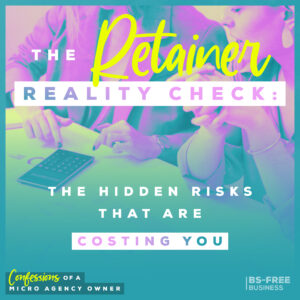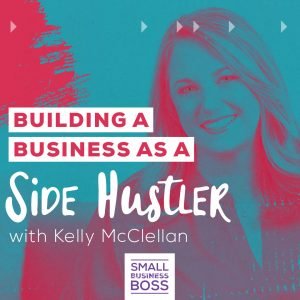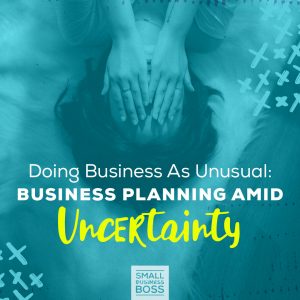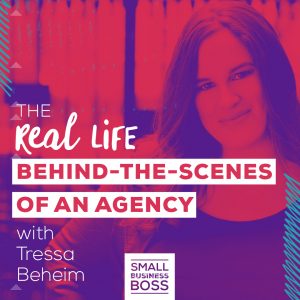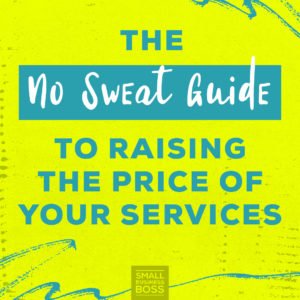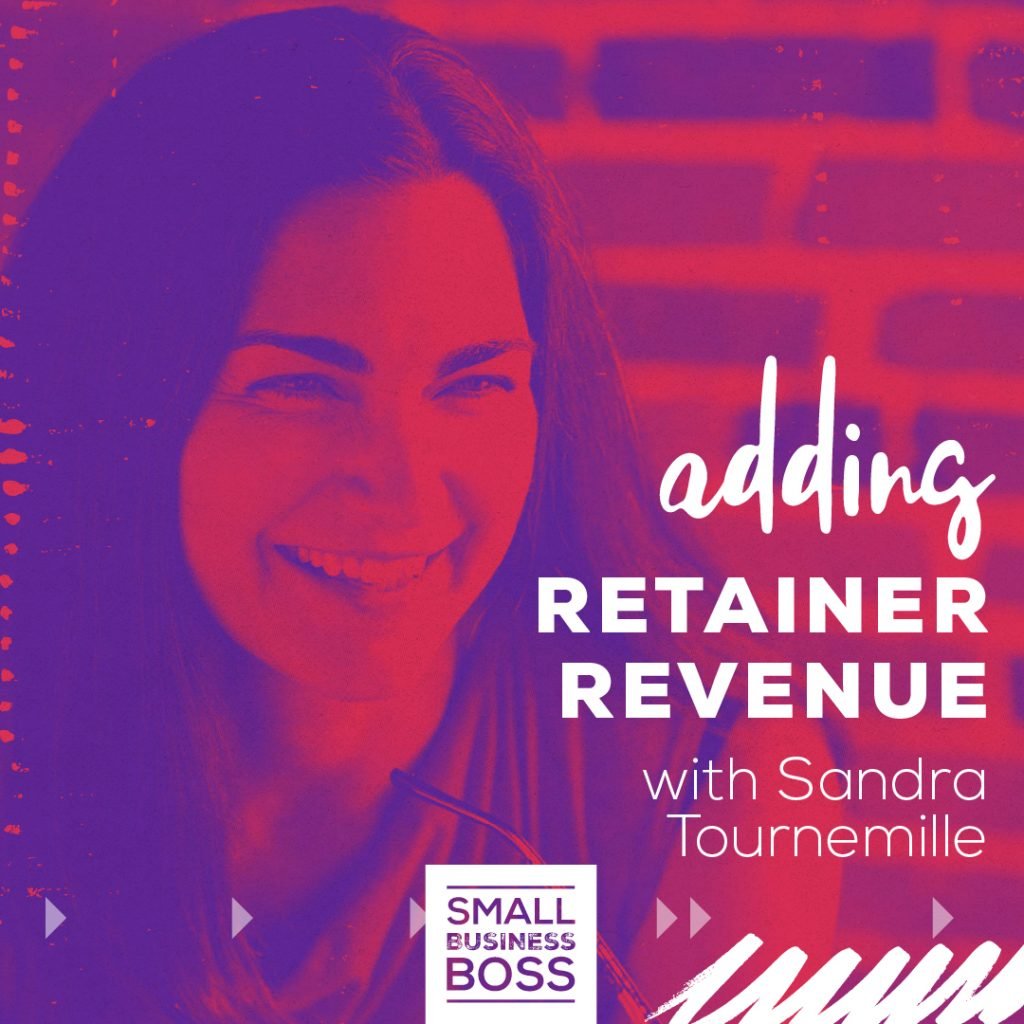
Search the site:
Episode 144: Adding Retainer Revenue with Sandra Tournemille
Retainers are one of those things that can be elusive to business owners, so in this episode, my guest Sandra Tournemille is going to share her experiences with adding retainer revenue and so much more. Let’s do this.
Sandra’s Bio:
Sandra Tournemille is a digital artist with a Bachelors of Media Art (Animation) from the distinguished Emily Carr University in Vancouver, BC. After graduating, she spent the following 12 years developing her career in 3D Graphics within the video game industry. She worked for top-tier companies, such as Electronic Arts and Ubisoft. In the spring of 2012, Sandra Tournemille left the corporate video game industry to establish a unique media art studio. A year later, Image Propeller Studios became one of nine portfolio companies to achieve tenancy in the Generator@One business incubation facility in St. Catharines, Ontario. Image Propeller Studios has worked with clients, such as Live Nation Canada, United Way, Brock University, Niagara College, and Innovate Niagara.
Can you tell us a little bit about your business and how you make money?
- I run a business where I actually work with other businesses and organizations, and I help them simplify or tell their message through either animation, video, or illustration.
- I work with larger businesses or corporate businesses, schools, universities, entrepreneurs, and small businesses to help them get their YouTube channels up and running, and edit their videos and whatnot.
What kind of services do you offer?
- We do everything that you would expect in almost like a film production.
- We meet with the client and discuss the message and branding.
- We break that down and simplify the main ideas and the main message.
- We’ll take that and create a script that we work on with you.
- From there, we go through the whole process of making a film.
- We do storyboards, we do background design — everything that comes with the animating and the motion graphics world.
- We then will build a video and deliver it for you so that you can upload it to your website, to YouTube, whatever you want to do with it to promote your business. Or, if it’s an educational video, to your students, to your online platforms.
- We spend a lot of time really digging into the business and your idea, your product — whatever it is that you want to tell the story — and really find out what the ‘it’ thing is about your business or your product and bring a story to it.
How did you get to the point of starting your business because you obviously had this skillset in a previous life?
- Finding that niche was a huge challenge.
- I was thrown into my business through unemployment because I was laid off of my job, my corporate job, which was spent working in the video game industry.
- I had a very pigeonholed expertise skillset in 3D graphics, and then coming from that and trying to figure out, “Okay, how can I find a client base or figure out how to do this freelance business?” when I was first starting. That was a super huge challenge.
- I think in the first two years, I pretty much did anything that anybody threw at me. I did anything from graphic design, illustration, a little bit of animation, and 3D graphics.
- I still worked in video games on and off, like on a contract basis, so I was doing a whole bunch of stuff, and I just didn’t know how to focus and niche down.
- I had met a couple of people who had already gone down this road of creating explainer videos. They were animators, they knew how to work in the software and build animation and make videos.
- I started to follow those people in my industry who were already developing this kind of service and just worked with them.
- I would work a lot, and I had a friend who had just started doing this business, and I followed her and figured out what she doing.
- Once I saw the inner workings of how this service could work, I slowly, very slowly started to reach out in my own network and say, “Hey, I’m trying to start this service. If you know anyone who might be interested in this kind of product, this video, promotional video, or explainer video, I’m here, and I’d love to work with you.”
- Initially, it was really through my network and specifically asking people if they would know anyone who wanted this service, and how I could help.
- Eventually, I got one little one here, one little project there.
- Meanwhile, I’m still doing all this other stuff just to pay the bills.
- It really was a very, very long process. I think after like one or two years of doing this, it eventually grew to the point where I decided, ‘Okay, this is my niche, and this is all I’m doing.’
- Through referrals and networking, it really grew to be my one main service.
I think so many times when people are starting businesses, they want to have the perfect package and the perfect thing, and I’m always like, ‘You know what? You’ll learn by doing.’
- Oh, absolutely. It’s such a process of refinement.
- Even now, I’ll do a project, and I’ll be like, “Oh, that part is still not working.” Then, I still have to go back and refix some things.
- Maybe there’s something in my onboarding, or there’s something in the way we deliver the script or how I handle the storyboard.
- The tiniest little things you’re just constantly refining.
- I’m finding that it’s very in depth, and it just takes a very long time.
It can get very messy. Thankfully, you can keep that behind the scenes from your clients, but sometimes it does come up, and the way you handle it and the way you communicate with your client, I find is such a huge deal. - I think that a couple of experiences that I’ve been through have really just taught me to keep that transparency with clients and let them know if there’s a part that I’m still trying to refine or trying to figure out.
- You don’t have to explain every detail but make sure that they know that you’re a human as well, and it’s not going to be perfect.
You run a creative business, so what kind of business experience did you have going into this, and how did you acquire some of the skills you needed to run a business?
- Talk about a disaster in the first couple of years.
- Unfortunately, they didn’t teach Business 101 in art school, so I pretty much had zero experience or any knowledge and really had no interest in business until I actually learned what was all involved in running a business.
- Now, I find it really all quite interesting, and I do get into it.
- When I first started, thankfully, there was a government-funded program that I could take that helped me launch my business.
- I don’t think they have it anymore, but it was a self-employment program.
- We did a business plan, we set up our basic accounting, figured out how to get our first couple clients — that kind of service was awesome for me because I literally had no clue what I was doing.
- Beyond that, the first couple of years, I was really just left to my own devices.
- I would talk to people, I read tons of books.
- I slowly started to get into the online world and find some online courses,
- I did find some really good courses and some of them not so great.
- Trial and error was a huge part of learning business, but I did find that I got really stuck in a lot of parts of my business. Like, really, really stuck.
- I think what was a real game changer was just finding the Double It Mastermind.
- Finding you Maggie, as a mentor, was probably the turning point in learning more about business and figuring out what I was supposed to be doing.
- Specifically, for my business, I can’t stress enough having someone come and tell you, ‘This is what you should do.’
So, one of the things you added this year was a new service for video editing to help generate some stable retainer revenue because your business is very cyclical and very much about the big projects. What have you learned from the retainer revenue experience?
- The elusive retainer — I really, really struggled to figure this out for such a long time.
- I would see graphic designers have these amazing retainers, people that they could just have income from every month, and here I am working project to project.
- But what I’ve learned about retainers is there are total pros and cons to it.
- First of all, it’s great. I love having clients for longer than one project because you get to know them, you can dig deeper in their business, and you can really show up and have valuable insight into how you can help them.
- Projects that are one-offs, you spend a lot of time upfront and then you finish the project, and it’s like, “Okay, well, hopefully, I’ll see you next year. Maybe you’ll want to do a video next year.”
- But starting up that whole service — talk about messy. It was really a lesson in handling overwhelm and just staying on track and staying focused.
- It was just hard. I think I’d taken for granted that the animation service naturally happened for me. It was hard, and it was long, but I was intentionally creating this video editing service, and I found that very difficult.
- It was a lot of work and quite messy in the beginning trying to figure out pricing and figuring out how to structure it.
- Once you have that set up, then you’ve got it.
- Again, it’s about refining it.
I think what was actually really cool about you adding that service and arriving at that was that there is no animation retainer really. It’s like you picked a skillset that was related, which wasn’t something you were doing. You were doing video editing but in a different way. You were able to identify something that is on the periphery and turn it into a retainer, which I think was really clever because a lot of times with retainers, we don’t know what that service could be, but we really want that ongoing revenue.
- Yeah, exactly. The other part of that service is it serves a completely different market which was really exciting for me.
- Because I love the people in the mastermind — and those are all the kinds of people I love to work with all the time — actually finding the type of service that could serve them was really exciting.
You are one of the original members of Double It, so I’ve had this amazing front row seat to watch you double your business. So, how has Double It impacted your business and your life?
- I remember having this conversation, and we bring it up often, you and I. Like, the whole conversation I had with you about always having the FOMO. Like, feeling like I’m missing something, right?
- I just felt like that was the whole point of me joining the mastermind, having a mentor, was helping me get grounded and feeling like, “Okay, this is what you need to do. This is when you need to do it.”
- Somebody who could really take a look at my goals and help me form those goals, and then stick to them and stay on the path, and be encouraging.
- I think the biggest impact has been just building my confidence as a business owner.
- I always felt overwhelmed, I felt stuck, I felt like I was all over the map. Should I do email marketing? Should I be doing a blog? What should I be doing, and when should I be doing this?
- It was just so overwhelming, so having another person, another group of minds, that would say, ‘No, you’re doing great. Stop being distracted, keep going on your path, and you’re going to get there.’
- Pricing is always such a challenge for me, and it’s been so good to have the accountability.
- So many times I would say, ‘I’m going to raise my price’ and then come back with my tail between my legs from the sales call saying, ‘No, that didn’t happen. Just totally bailed on that.’
Do you remember the first time we ever spoke, and you were like, ‘I don’t want to talk about mindset?’ Brittany and I were like, ‘That’s fine, we don’t have to talk about mindset,’ and I think that’s actually one of my favorite things about Double It. We will do the mindset work if you want to do it, but you don’t have to do it either. We can just talk business in a really linear Type A kind of way.
- Right, and famous last words because now I’m always talking to you about mindset which is hilarious.
- I think what initially attracted me to Double It was I really wanted actionable things to do.
- I didn’t want to do talk about it all the time. I actually wanted to have very specific actions to take in my business, so that I knew when I do A, B, and C, I’m going to get whatever it is I’m looking for.
- It was just super impactful to actually go through the process and look back on the year and know I actually achieved my goal. That’s amazing. It truly is.
One of the things I love about your business is that you are really proactive about lead gen. You go to the place where a lot of people will not go, which is cold outreach. I want to know, how many of your clients come by referrals? How many come by cold outreach? Can you break that down a little bit for us?
- I have to say the majority of my clients do come from referrals. That, I think, is the base of most service-based businesses. Also, networking through friends and colleagues from my career before and then just meeting new people all the time.
- The outreach is smaller — it’s the long game for me.
- The cold outreach is essentially me researching, very deeply, people that agencies or my dreamy clients and I find through LinkedIn.
- I’ll actually do searches on LinkedIn and see what their role would be.
- Once I’ve researched them well enough that I feel comfortable to reach out to them, I’ll introduce myself, and I’ll send them a link to my demo reel, so they can actually see my work upfront.
- I have scripts that I do.
- I actually have quite a few agencies respond to me, and I think that’s because I do the research up front.
- I don’t just copy and paste a script.
- I do have scripts that I work from, but I always, always put in something personal or something that I’ve noticed about their agency or the work they’ve done, and I always include that information along with my demo real because they want to see that you’re legit and that you actually have work to show.
- Usually, I’ll get a response like, ‘Yeah, your work is great. We’ll keep you on the roster,’ and then that is an indication for me to make sure that I follow up.
- It’s always about coming back, and I’ll either follow up with, ‘Hey, how are you doing?’
- If I notice that they put out a new project or a new initiation or something with their business, then I’ll just mention that.
- Or, if I have a new demo real, I’ll reach out to all of these people and say, ‘Hey, I’ve got a new demo real. I’d love to hear if you need any help. I’m always here. Just let me know.’
You’ve had things net out like 2-3 years later, which I love because so many times, people just drop the ball with that kind of outreach.
- I have to say, I’m not perfect.
- There are a lot of them that I’ve dropped the ball on too, but for the ones that I have stuck it out, it’s pretty amazing to reap those seeds that you planted years ago, and then it’s like, ‘Wow, I’ve actually got this awesome gig.’
I know, because you’ve been in Double It for a while, that a lot of your fellow masterminders have become some of your business BFFs. How have these relationships impacted your business?
- They really are my BFFs.
- It’s funny because I’ve got my online friends and my every day…what do you call it? Reality friends.
- My business BFFs are the world to me. My support system, my encouragement.
- I have some great friends here, obviously. I don’t want to discount my good friends.
- My business friends, they get it. They understand — especially because we’re all in the online space, and it can be tough.
- You’re working alone in your office all day long, and there may be days where you don’t even really leave your house or talk to people other than your family.
- It can get difficult, so having these friends that I’ve made amazing relationships with through the mastermind and through our in-person events, have been amazing.
- I can’t say enough about how important it is to have a support system while you’re doing this business thing because you have such low days.
- You have super high days, and you have really low days, and it’s like you really need to have somebody who gets you and understands what you’re going through to be able to talk about them.
Lessons:
- As a true creative, Sandra didn’t have any business training, so she had to go through trial by fire in her first few years in business. Getting help to figure it out was key to her being able to move ahead in her business.
- Sandra struggled to figure out how to add retainer revenue, and it required her to get creative. If you’re looking for ways to add retainer revenue, you may need to look for different offerings that may not be immediately obvious.
- Don’t be afraid to transfer your skills to a new offer, or like Sandra did, in a new market with her video editing. It can take time to experiment, but if steady, ongoing revenue month over month is the result, it’s worth it.
Links for This Show:

I’m Maggie Patterson (she/her), and services businesses are my business.
I have 20+ years of experience with client services, am a consultant for agency owners, creatives, and consultants, and vocal advocate for humane business practices rooted in empathy, respect, and trust.
Read or Listen to the Latest
Check Out These Posts
For Solo Business Owners

Growing a solo service business is tough.
It’s even harder when you’re bombarded with BS advice that steers you away from your values and why you started your business in the first place.
This is the podcast for solo creatives and consultants who want to remain as a team of one and have zero interest in the hustle and grind of typical business teachings.
Subscribe now and never miss an episode.
For Micro Agency Owners
Most podcasts for agency owners obsess over revenue growth as the ultimate success metric.

But here’s the truth: not everyone wants to make millions. Your goal might be to build a sustainable business that lets you have a life and doesn’t run you into the ground.
Join me as I spill my shameless confessions and share everything I’ve learned about building a micro agency that skips the BS of tired and typical agency teachings.
Follow Now on All Major Podcast Platforms
